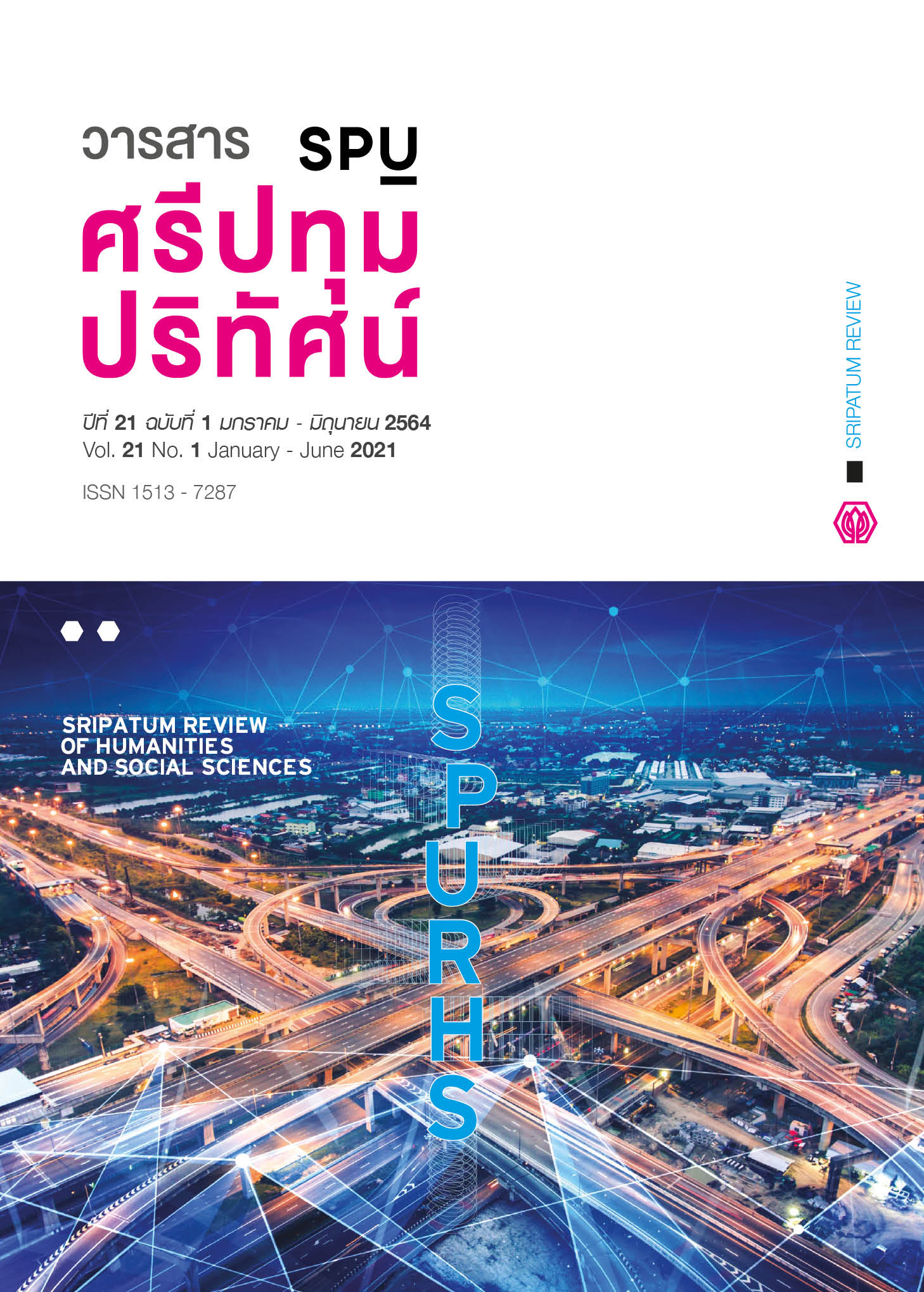A A Study of the Invariance of the Causal Relationship Model between Human Resources Management, Job Satisfaction and Organizational Loyalty of Thai Hotel Employees
Main Article Content
Abstract
The objective of this research was to examine the invariance of the causal relationship between factors of human resource management (HRM), job satisfaction, and organization loyalty. A total of 406 samples were selected from 5 stars hotel employees in Thailand by using multi-stage sampling method. Multi-group analysis was used to analyze the data. The results of this research showed that the model form, factor loadings, and scalars had invariance between male and female employees and operational and supervisor level employees. These mean that this causal model could use for both male and female employees and employees at all levels.
Article Details
1. กองบรรณาธิการสงวนสิทธิ์ในการพิจารณาและตัดสินการตีพิมพ์บทความในวารสาร
2. บทความทุกเรื่องจะได้รับการตรวจสอบทางวิชาการโดยผู้ทรงคุณวุฒิ แต่ข้อความและเนื้อหาในบทความที่ตีพิมพ์เป็นความรับผิดชอบของผู้เขียนแต่เพียงผู้เดียว มิใช่ความคิดเห็นและความรับผิดชอบของมหาวิทยาลัยศรีปทุม
3. การคัดลอกอ้างอิงต้องดำเนินการตามการปฏิบัติในหมู่นักวิชาการโดยทั่วไป และสอดคล้องกับกฎหมายที่เกี่ยวข้อง
References
Akova, O., Cetin, G. and Cifci, I. (2015). The Relation between Demographic Factors and the Turnover Intention in Pre-Opening Hotel Businesses. Procedia - Social and Behavioral Sciences, 207, 377–384.
Bollen, K. A. (1989). Structural equations with latent variables. New York: John Wiley Sons.
Cheng, C. C. and Krumwiede, D. (2012). The role of service innovation in the market orientation-new service performance linkage. Technovation, 32, 487–497.
Emiroğlu, B. D., Akova, O. and Tanrıverdi, H. (2015). The relationship between turnover intention and demographic factors in hotel businesses: A study at five-star hotels in Istanbul. Procedia - Social and Behavioral Sciences, 207, 385–397.
Gieter, S. D., Hofmans, J. and Pepermans, R. (2011). Revisiting the impact of job satisfaction and organizational commitment on nurse turnover intention: An individual differences analysis. International Journal of Nursing Studies, 48, 1562–1569.
Hair, J. F., Black, W. C., Babin, B. J. and Anderson, R. E. (2014). Multivariate Data Analysis. 7th ed. Harlow: Pearson Education Limited.
Hofmans, J., Gieter, S. D. and Pepermans, R. (2013). Individual differences in the relationship between satisfaction with job rewards and job satisfaction. Journal of Vocational Behavior, 82, 1–9.
Jeon, H. and Choi, B. (2012). The relationship between employee satisfaction and customer satisfaction. Journal of Services Marketing, 26(5), 332-341.
Kara, D., Uysal, M. and Magnini, V. P. (2012). Gender differences on job satisfaction of the five-star hotel employees: The case of the Turkish hotel industry. International Journal of Contemporary Hospitality Management, 24(7), 1047–1065.
Kaemkate, W., Wiratchai, N. and Pitiyanuwat, S. (1997). A Development of Teacher Utilization Efficiency Indicators and an Invariance Testing of Teacher Utilization Efficiency Models Using the Analysis of Multiple Group Structural Equation Model. Journal of Research Methodology, 10(2), 19–45. (in Thai)
Kittiakkaraphokin, C. (2018). Validation and Invariance Analysis of Causal Relationship Model of Work Happiness among Employees of Sumitomo Electric Wiring Systems (Thailand) Limited. Journal of Yala Rajabhat University, 13(1), 73–85. (in Thai)
Lee, Y. K., Kim, S. and Kim, S. Y. (2014). The Impact of Internal Branding on Employee Engagement and Outcome Variables in the Hotel Industry. Asia Pacific Journal of Tourism Research, 19(12), 1359–1380.
Marescaux, E., De Winne, S., Brebels, L. and Sels, L. (2015). Managing Differences between Employees: Different Perspectives on HR Differentiation. The Proceedings of Academy of Management Annual Meeting, 7–11 August 2015 at Vancouver, 1-6.
Mokaya, S. O., Musau, J. L., Wagoki, J. and Karanja, K. (2013). Effects of Organizational Work Conditions on Employee Job Satisfaction in the Hotel Industry in Kenya. International Journal of Arts and Commerce, 2(2), 79-90.
Punsritum, K. and Sakulku, J. (2017). Effects of Job Engagement, Organizational Commitment, Job Satisfaction on Turnover Intentions in Employees of a State Enterprise. Sripatum Review of Humanities and Social Sciences, 17(1), 16–22. (in Thai)
Saraç, M., Meydan, B. and Efil, I. (2017). Does the relationship between person–organization fit and work attitudes differ for blue-collar and white-collar employees?. Management Research Review, 40 (10), 1081-1099.
Turkyilmaz, A., Akman, G., Ozkan, C. and Pastuszak, Z. (2011). Empirical study of public sector employee loyalty and satisfaction. Industrial Management and Data Systems, 111(5), 675–696.
Wongsuntorn, P., Naressenie, K. and Homying, W. (2012). Factors Contributing to Happiness at Work of Employees in The Magnetics Head Operation Section, Western Digital (Thailand) Company Limited. Independent Study of the Degree of Master of Public Administration. Pathum Thani: Valaya Alongkorn Rajabhat University. (in Thai)
Yang, J. T. (2010). Antecedents and consequences of job satisfaction in the hotel industry. International Journal of Hospitality Management, 29, 609–619.


